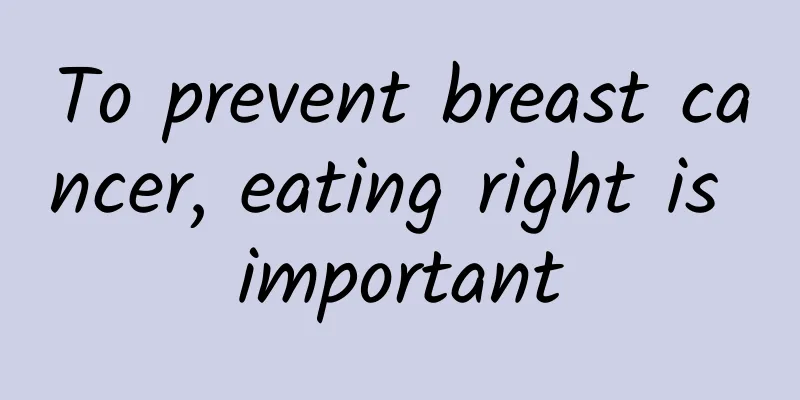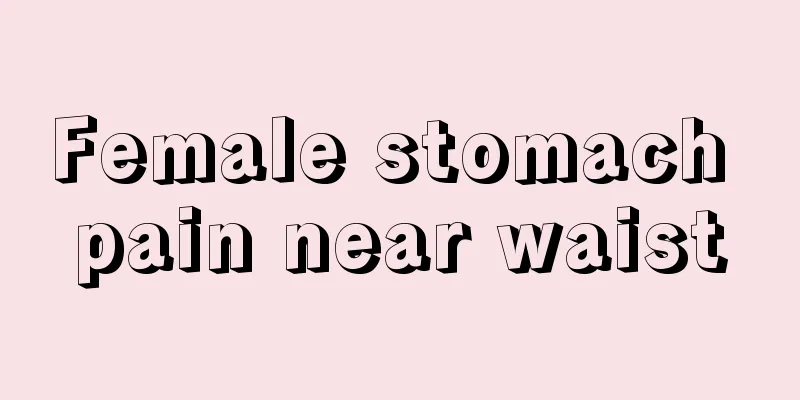To prevent breast cancer, eating right is important

|
Every October is Breast Cancer Prevention and Awareness Month , which aims to raise awareness of breast disease prevention among more women. Breast cancer is the second most common type of cancer in the world and the most common cancer among women, and its incidence is increasing year by year. Among the established risk factors for breast cancer, nutrition and dietary structure are closely related to the occurrence of breast cancer. Among them, obesity caused by alcohol intake and a high-fat, high-calorie diet are risk factors that have been confirmed by epidemiological studies. As people's living standards continue to improve, awareness of cancer prevention is also gradually increasing. People often ask, are there any good dietary suggestions for preventing breast cancer? Let's analyze them one by one. (Photo source: Healthy China) Limit or avoid drinking Many people have the habit of drinking, but alcohol intake is closely related to the occurrence of many cancers. Epidemiological studies have shown that drinking can increase the risk of breast cancer. If you consume 10 grams of alcohol more per day, the relative risk of breast cancer will increase by 7%. Excessive drinking can cause liver damage, affect the liver's inactivation of estrogen, and thus affect changes in hormone levels in the body. Regular drinking can affect the sex hormone levels of premenopausal and postmenopausal women, and acetaldehyde is a product of alcohol metabolism and has been proven to be carcinogenic. In addition, alcohol is also a lipid solvent that can enhance the permeability of human cells to carcinogens. For men, excessive drinking can also affect the liver's inactivation of estrogen and increase the risk of male breast cancer. Therefore, for people with long-term drinking habits, especially those with liver disease or liver damage, controlling and reducing alcohol intake can help prevent breast cancer. Appropriately reduce fat intake With the improvement of living standards, the proportion of fat intake in people's daily diet is constantly increasing. Higher fat intake may induce breast cancer, which is related to the excessive intake of fat leading to increased secretion of endogenous estrogen. Studies have shown that people who adhere to a low-fat diet can reduce the risk of breast cancer by about 9%, and appropriately reducing fat intake can prevent breast cancer. High-fat foods not only include fatty meat, cooking oil, etc., but also some fried foods, dishes cooked with excessive oil, fruits such as avocados and durian, and animal offal such as goose liver and pork liver. Even if they do not look "too greasy", they are actually rich in fat and should be eaten less appropriately. Although consuming too much fat may induce breast cancer, it does not mean that all fat-rich foods should not be eaten. Fats can be divided into saturated fatty acids, monounsaturated fatty acids and polyunsaturated fatty acids. Epidemiological studies have shown that the effects of consuming different types of fatty acids on the risk of breast cancer are different. Excessive intake of monounsaturated fatty acids and saturated fatty acids will increase the risk of breast cancer. At the same time, studies have shown that consuming omega-3 polyunsaturated fatty acids from marine sources can reduce the risk of breast cancer to a certain extent. Therefore, appropriate intake of marine fish and fish oil rich in such fatty acids can help prevent the occurrence of breast cancer. Eat more vegetables and fruits Many ingredients in vegetables and fruits are believed to have a role in preventing cancer. Since the 1990s, studies have shown that people who consume more vegetables and fruits have a lower risk of cancer. A 2012 meta-analysis showed that a higher intake of fruits, berries, and vegetables can reduce the risk of breast cancer by about 41%. Different fruits and vegetables contain different nutrients. The summary results of multiple cohort studies show that consuming more carotenoids can reduce the risk of breast cancer, so vegetables and fruits rich in carotenoids are recommended, such as carrots, broccoli, kale, tomatoes, pumpkins, sweet potatoes, sea buckthorn fruit, mangoes, oranges, cantaloupes, etc. Fruits and vegetables are also important sources of dietary fiber for the human body. Dietary fiber can prevent breast cancer by binding to estrogen and reducing the reabsorption of estrogen by the colon. In addition, many ingredients contained in fruits and vegetables, such as glucosinolates and indoles, have certain effects in preventing breast cancer. Therefore, vegetables and fruits rich in cellulose, such as coriander, wheat, coix seeds, bananas, apples, grapefruits, and cruciferous vegetables rich in glucosinolates and indoles, such as Chinese cabbage, cauliflower, kale, and cabbage, can all play a certain role in preventing breast cancer. Eating more fruits and vegetables can help prevent breast cancer, but it must be noted that people with diabetes should control their intake of fruits with high sugar content to maintain stable blood sugar levels. Moderate intake of soy products For centuries, soybeans and their products have been an important part of the Asian diet. They are the main source of isoflavones in the phytoestrogen family. Many laboratory data show that isoflavones have a wide range of biological effects, including inhibiting the growth of breast cancer cells. Studies on Asian women have shown that people with a higher intake of soybeans and soy products have a lower risk of breast cancer. Taking 10 mg of isoflavones per day can reduce the risk of breast cancer by 16%. However, the mechanism of action of soybeans and their products in preventing breast cancer is still unclear. The metabolism of isoflavones also varies greatly among different individuals, so the intake of soy products should be moderate. There are many ways to prevent breast cancer, and a proper diet can play a preventive role. Among dietary recommendations, reducing alcohol consumption and refusing obesity are the most important preventive strategies. |
>>: LinkedIn's registered users exceed 200 million - data infographic
Recommend
New blood test method: A sharp eye for identifying Alzheimer's disease
Author: Duan Yuechu A new blood test could help d...
How many folic acid pills should I take every day
In the early stages of pregnancy, it is very impo...
Vulvar itching and yellow leucorrhea pictures
Vulvar itching can occur at any time without any ...
How is vaginal candidal infection caused?
Vaginal candidiasis or trichomoniasis vaginitis, ...
How many hours after drinking rice wine should you breastfeed?
Pregnant women will have poor breast milk product...
How does the cervix change during pregnancy?
The basic shape of a woman's body will underg...
What is the standard for hypertension in my country in 2020? 5 major rumors about hypertension! Debunked one by one
In 2020, the latest "Hypertension Guidelines...
Symptoms of normal amenorrhea in women
Women will gradually experience menopause when th...
What are the ingredients for breast enhancement in traditional Chinese medicine?
Flat chest is a big worry for women, because brea...
How much does it cost to do a B ultrasound
With the continuous development of ultrasonic ima...
Why is there bleeding in the lower body?
Bleeding from the lower body should be taken seri...
Is it normal for pregnancy symptoms to disappear suddenly?
Presumably, many pregnant women have gone through...
Pros and cons of fallopian tube embolization
Fallopian tube embolization is a common surgical ...
How to relieve uterine contraction pain after normal delivery
When pregnant women choose natural childbirth, mo...
Sweet Trap: Decoding the Hidden Crisis of Diabetes
Science expert: Li Danchan Unit: Public Health De...









